Discover What is the Best Mulch for Your Landscaping
Explore the transformative power of mulching and learn how the right mulch can enhance soil health, suppress weeds, and beautify your garden beds, all while supporting vibrant plant growth.
Mulching is a crucial practice in landscape management that provides numerous benefits to your garden and plants. Mulches, which are materials spread over the soil’s surface, help maintain moisture, suppress weeds, and enhance the garden’s visual appeal, beautifying a garden bed. Available in various organic and inorganic types, each mulch is suited to different landscaping needs and aesthetic preferences.
Key Article Highlights:
- Moisture Conservation: Mulches help retain soil moisture, reducing the need for frequent watering.
- Weed Suppression: Both organic and inorganic mulches effectively block light to weed seeds, preventing their growth.
- Soil Health: Organic mulches decompose over time, adding essential nutrients and organic matter to soil.
- Aesthetic Appeal: Mulches can be chosen in various materials and colors to complement the garden’s design.
The primary purposes of using landscape mulches include conserving moisture in the soil, reducing weed growth – ensuring the mulch is free of weed seeds – and adding nutrients back into the earth. Organic mulches such as wood chips, nuggets and shredded leaves help retain moisture and decompose over time, enriching the soil with organic matter and releasing nutrients that promote soil health and fuel plant growth. These types enhance the soil’s fertility and are vital in creating a nurturing environment for microbial organisms.
In contrast, inorganic types of mulch, such as rock and rubber mulch, offer durability and stability. These materials do not break down, making them ideal for areas where longevity is a priority. Both organic and inorganic mulches are essential in maintaining structure and temperature, ensuring that plants remain healthy throughout the growing season.
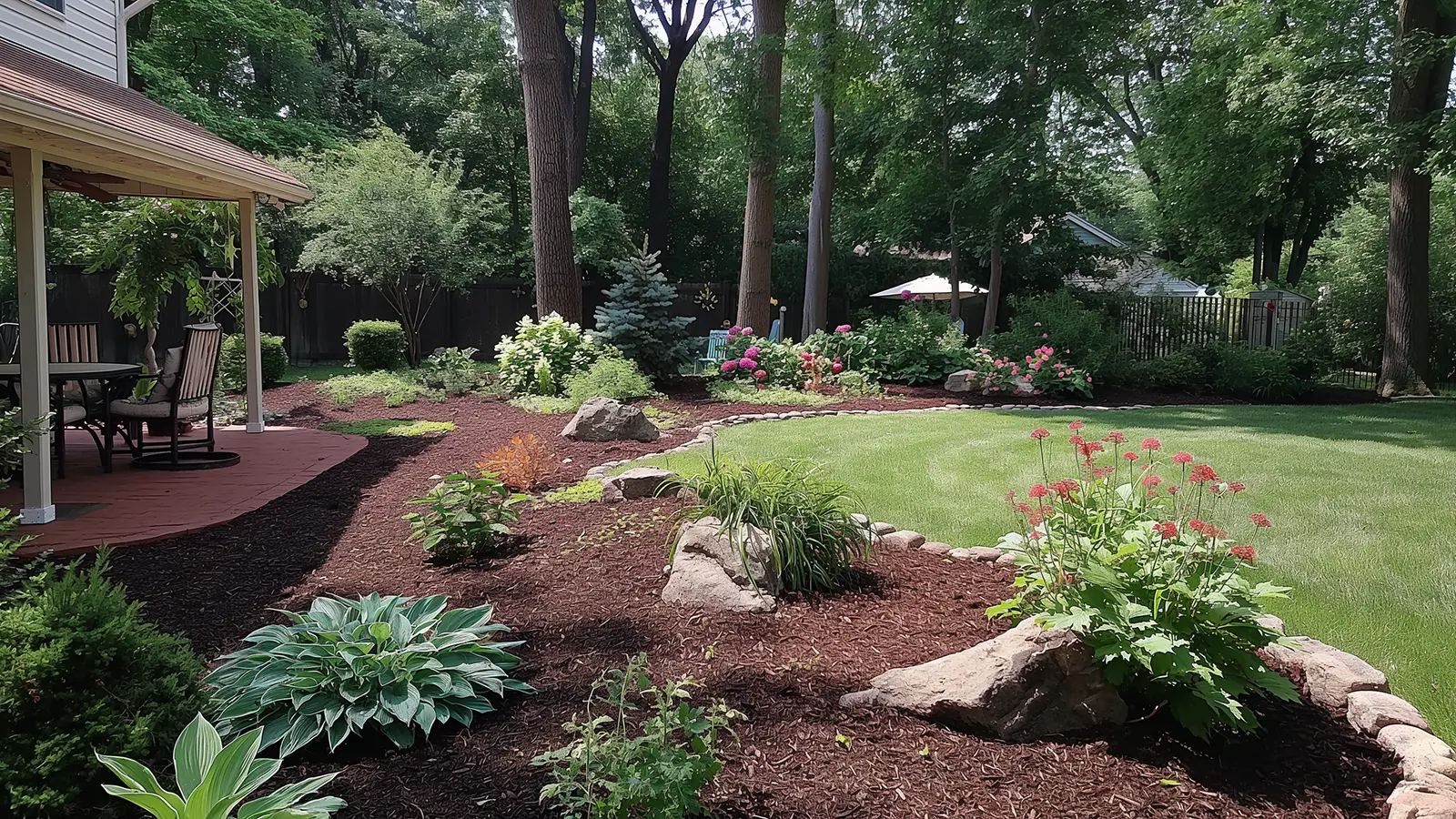
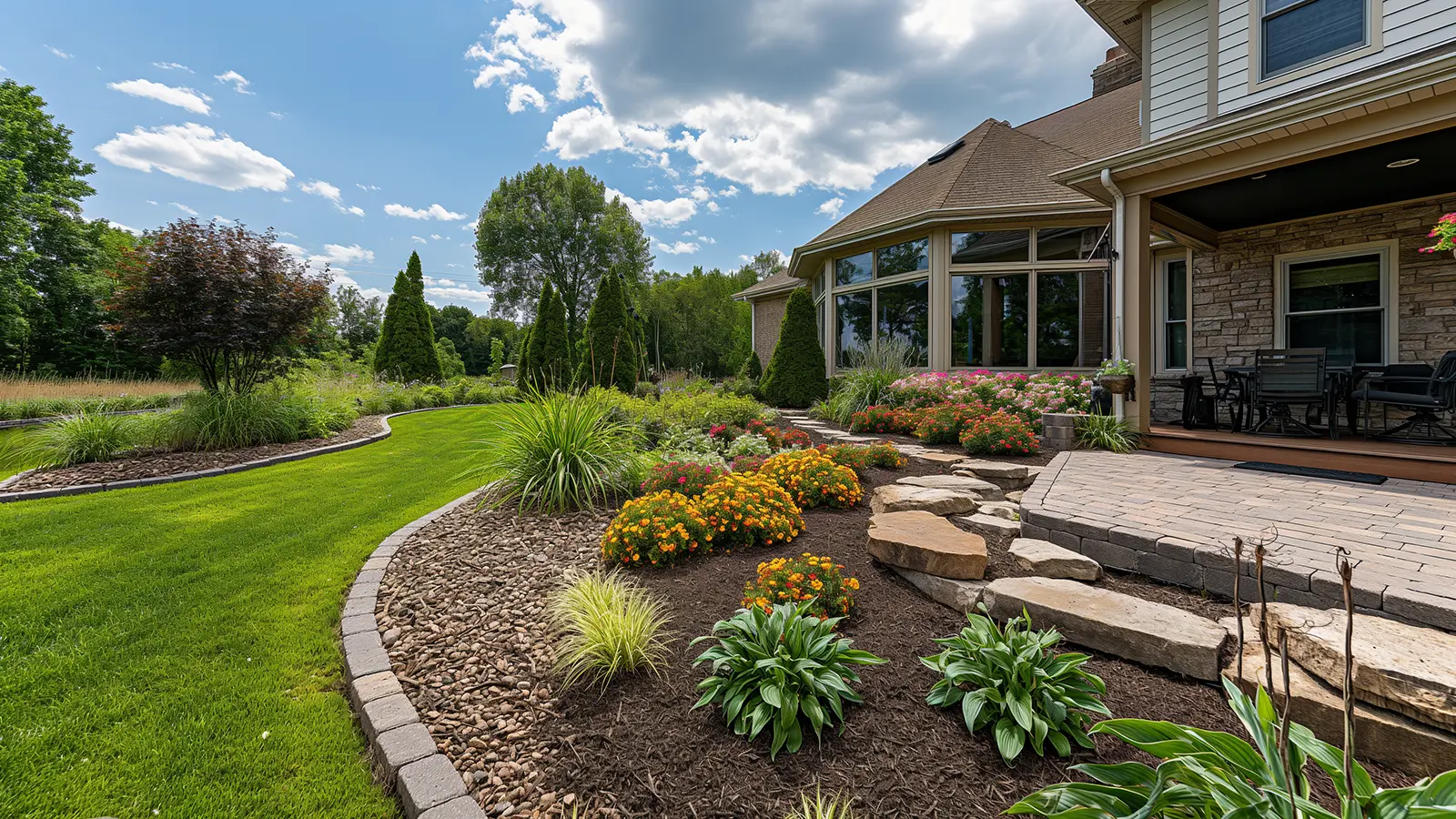
The Benefits of Mulch
Landscape mulch is essential for conserving moisture, reducing weed growth, and enriching the soil with nutrients, essential for maintaining a healthy garden. Organic mulches like wood mulch and bark nuggets help retain moisture and improve soil structure as they decompose, while inorganic options such as rock and rubber mulch provide durability and long-lasting coverage. Both types play a crucial role in temperature regulation and protecting plant roots from extreme weather, which keeps plants healthy throughout the growing season.
Key Benefits of Mulch Include:
- Moisture Retention: Mulch helps keep the soil moist, reducing the need for frequent watering.
- Weed Suppression: A layer of mulch prevents many weed seeds from sprouting, easing garden maintenance.
- Temperature Control: Mulch acts as insulation, stabilizing soil temperature across seasons.
- Pest Repellence: Some bark mulch contain natural chemicals that repel insects, safeguarding plants.
- Environmental Benefits: Mulch-covered soil holds onto carbon, aiding in carbon dioxide reduction.
- Erosion Control: Heavier mulches, such as rock, resist being washed away by rain, preserving soil integrity.
By choosing the appropriate type of mulch for specific areas and needs, gardeners can enhance the beauty and health of their gardens while promoting a more sustainable environment. This strategic use of mulch ensures optimal plant growth and minimizes ecological footprints, making it a vital practice in effective garden management.

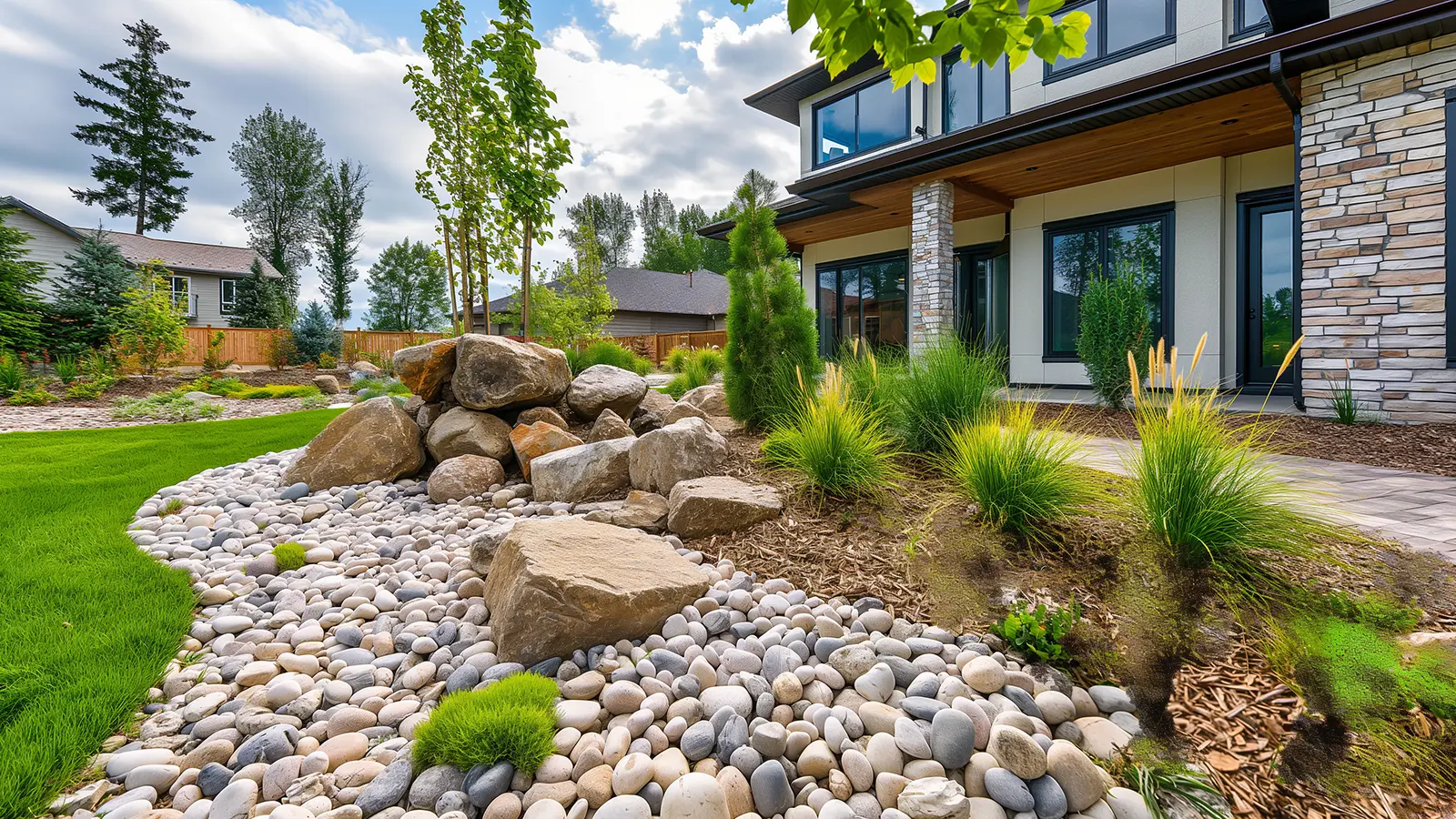
Types of Landscape Mulch
Mulching is more than just a garden task; it’s a strategic decision that impacts the health of your plants and the overall aesthetics of your landscape. The choice between organic and inorganic mulch hinges on the specific needs of your garden, including factors like soil health, moisture management, and the desire for aesthetic appeal. Each type of mulch offers unique benefits and considerations that can influence plant growth, soil conditions, and maintenance requirements. Understanding these options will guide you in making the most effective choice for your garden’s long-term success and sustainability.
Common Mulch Types:
- Shredded Bark: Often from cedar trees, it is cost-effective for slopes due to its slow decomposition but may require nitrogen supplementation as it breaks down.
- Straw: Its golden color and slow decomposition make it ideal for vegetable gardens and strawberry plants, but, to prevent unwanted growth, ensure it’s weed-seed-free.
- Compost: Dark and soil-like, compost quickly enriches soil structure and is usually inexpensive or free. It should be heated sufficiently to eliminate weed seeds before use.
- Pine or Cedar Bark Chips: Known as nuggets, these are larger and last longer but can be prone to displacement by water, making them less suitable for sloped areas.
- Stones and River Rock: Expensive, non-decomposing materials used in cacti and rock gardens; covered with landscape fabric to prevent weed growth in non-plant areas.
Let’s explore the distinct characteristics of both organic and inorganic mulches. By examining the properties of organic mulches, you’ll learn how they contribute to soil fertility and structure, helping to create a nurturing environment for your plants. Conversely, the section on inorganic mulches will highlight their practical benefits in moisture conservation and weed control and their suitability for specific landscaping challenges. This knowledge will empower you to select the best mulch type that aligns with your gardening goals and environmental conditions.
Organic Mulches
Organic mulches, made from natural, decomposable materials, enrich garden soil. Top choices include pine or cedar bark, cedar bark chips, shredded bark and grass clippings. These organic materials break down over time, enhancing soil structure and increasing nutrient availability for plant roots. Organic mulch improves soil moisture retention and temperature regulation and promotes robust plant growth. Additionally, cedar bark or other organic mulch repels insects best, making them a preferred choice for gardeners looking to protect their plants naturally.
Inorganic Mulches
Inorganic mulch, made from materials like river rock, stones, and rubber, does not contribute organic material to the soil but excels in conserving moisture and controlling weed growth without frequent replenishment. Specifically, inorganic materials, river rock, stones, and landscape fabric are optimal for situations that require durability and stability, such as landscapes prone to heavy rain or sloped terrains where erosion control is critical. This mulch, including stones and river rock, effectively maintains its form and function over time, ensuring long-lasting coverage and support.
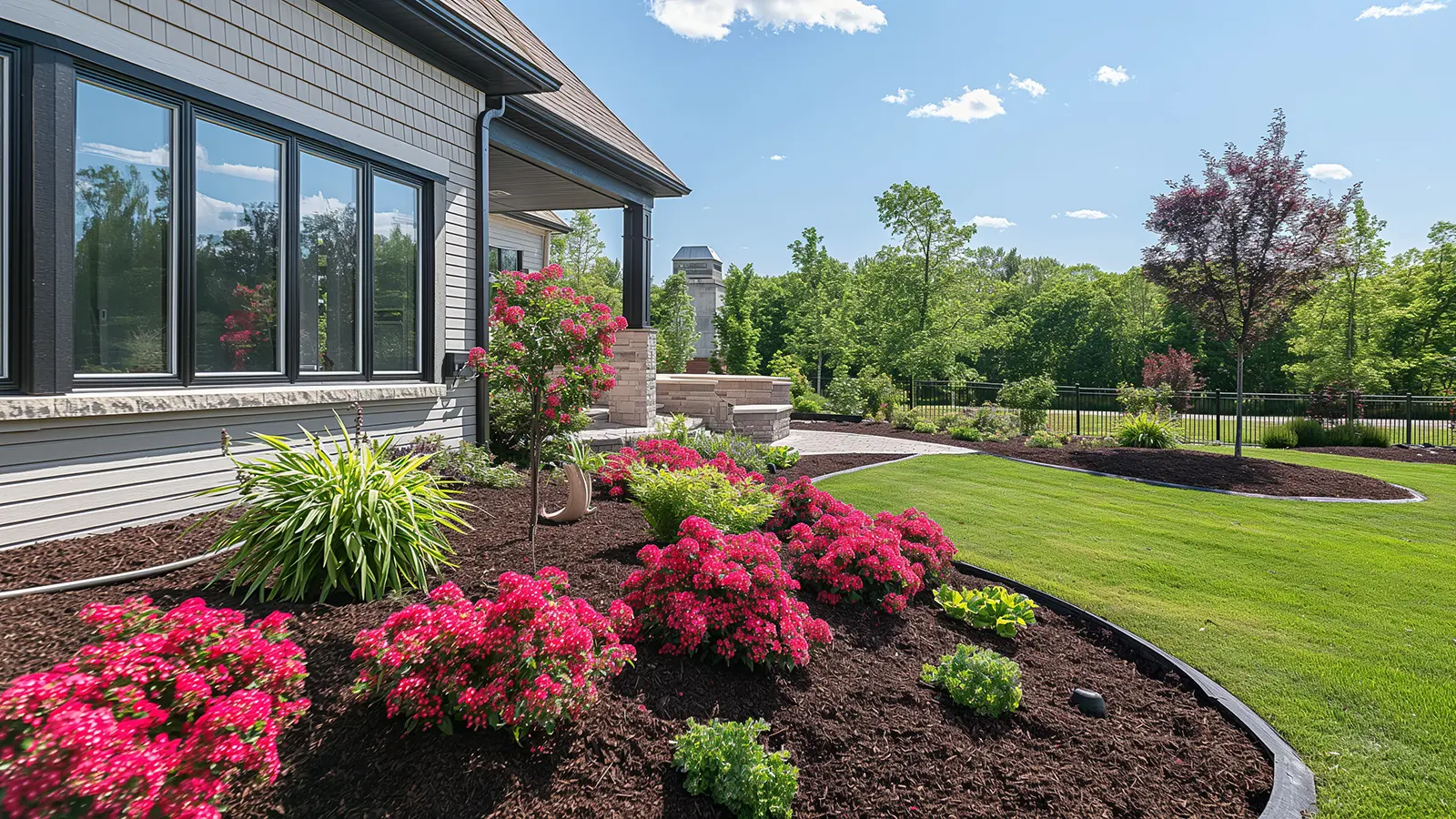
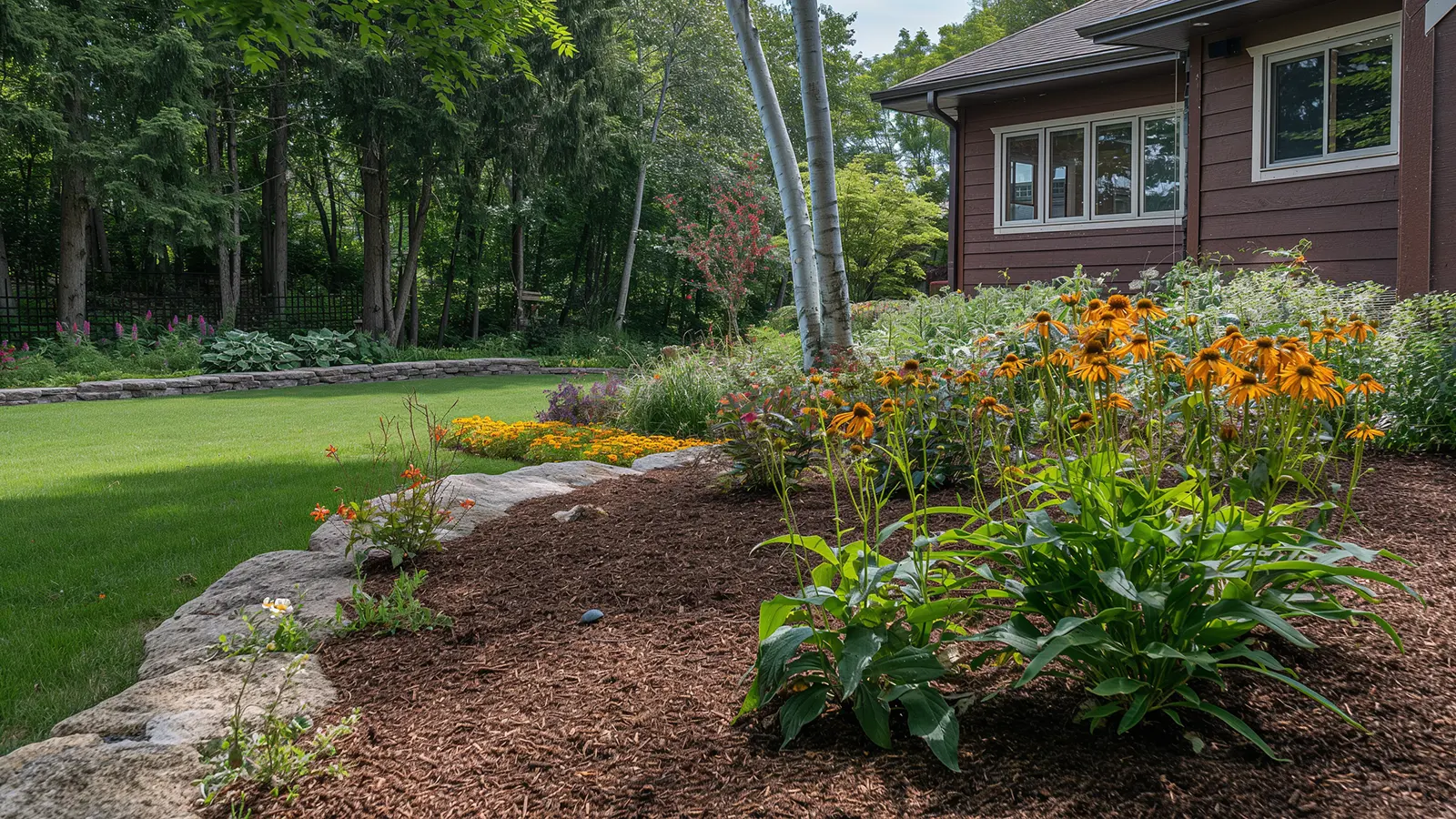
Choosing the Right Mulch for Your Garden
When choosing the best mulch for your garden, consider how it will enhance the visual appeal of your landscape. Bark mulch and wood mulches are favored for their natural look, while colored mulches offer a range of hues for those desiring a splash of color. Textured options like pine nuggets and wood chips are excellent for beautifying garden beds, providing aesthetic and functional benefits such as moisture retention and weed suppression.
Key Considerations for Mulch Selection:
- Garden Bed Enhancement: Textured mulches like nuggets add visual interest and functional benefits.
- Color Options: Colored mulches can complement the colors of your home or garden.
- Preventing Weeds: A layer of mulch acts as a barrier, preventing weeds from sprouting and simplifying garden maintenance.
- Beautifying Effect: Choose the best mulch to enhance the beauty and health of your garden.
Repurposing organic materials such as grass clippings, shredded leaves, and other yard waste as mulch efficiently uses resources and greatly benefits your garden. These materials decompose over time, enriching the soil with nutrients and fostering beneficial microbial activity, particularly in creating a fertile environment for vegetable gardens. Additionally, producing your mulch through composting can significantly enhance soil quality by adding essential nutrients. However, using compost sparingly as mulch is important to avoid overwhelming your plants and risking fertilizer burn, ensuring a balance between nourishment and growth.
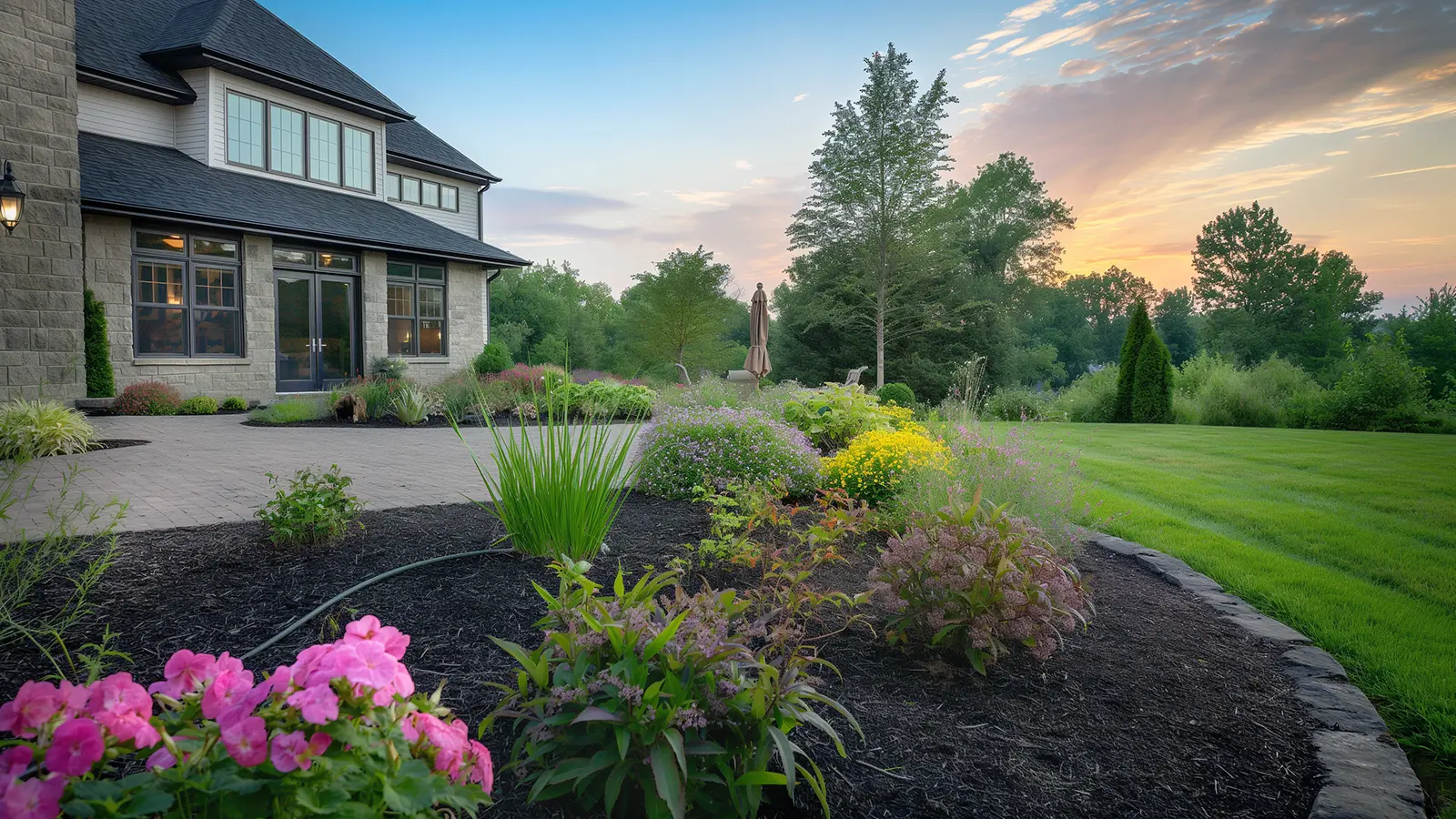
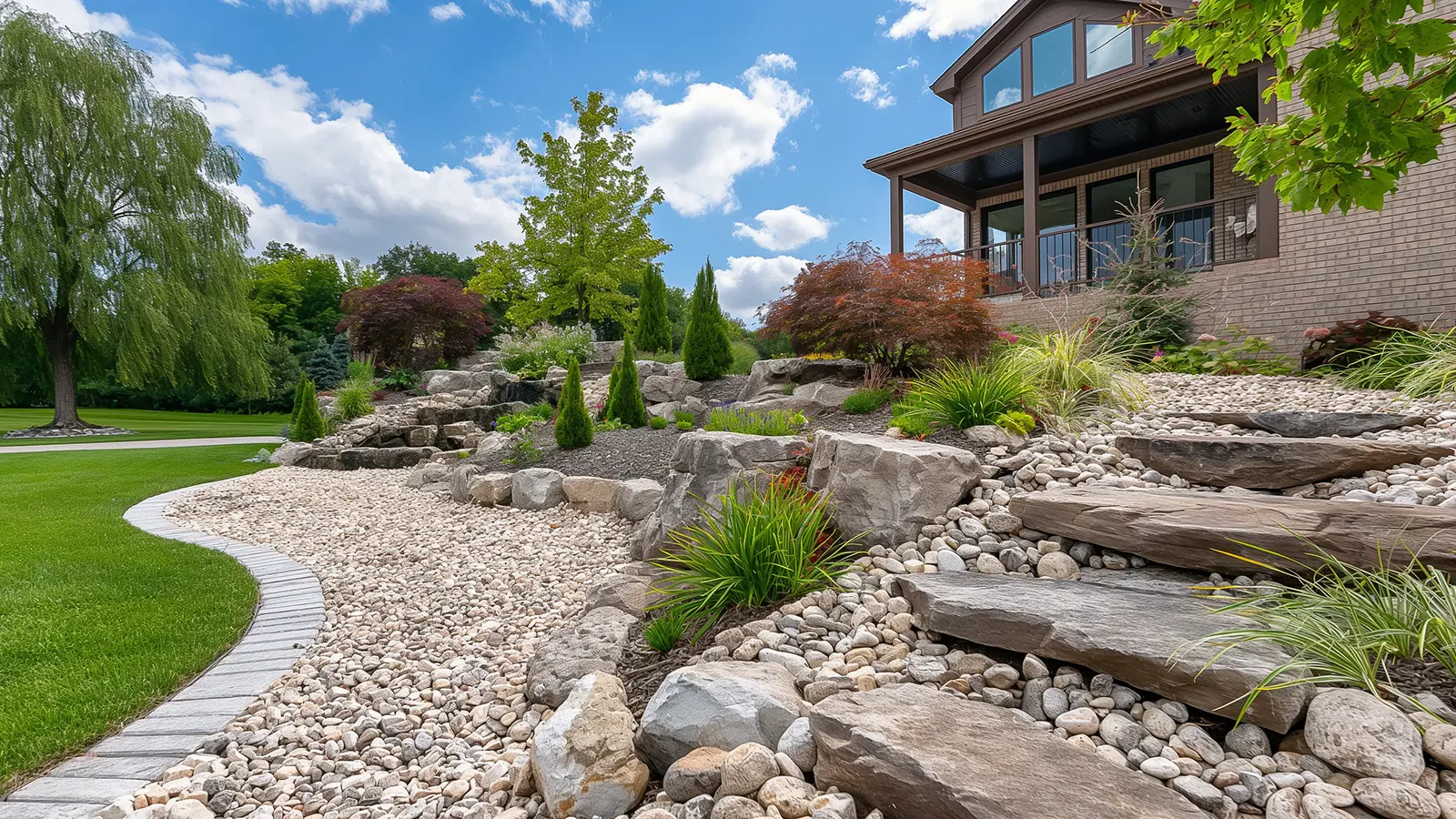
Practical Considerations for Mulch for Your Landscape
Choosing the right mulch for your garden depends on several factors: the type of plants, soil conditions, specific gardening goals, and local climate considerations. Organic mulches, such as compost or bark mulch, are highly beneficial for their nutrient-rich properties and ability to regulate soil temperature, particularly in regions with fluctuating temperatures. These types of mulch contribute essential organic matter that decomposes over time, enhancing soil fertility and structure. This is particularly important for maintaining moisture levels and ensuring nutrients promote soil health effectively.
For those seeking minimal maintenance, inorganic mulches like river rock or rubber mulch are advantageous because they rarely need to be replaced and can withstand harsh weather conditions, ensuring the mulch won’t wash away with rain. These mulches can be complemented with landscape fabric, which enhances weed suppression without hindering the soil’s access to water and air. Inorganic mulches are ideal for areas exposed to heavy rain or wind, where lighter, organic types like shredded bark might immediately wash away. Using a ton of bagged mulch labeled as bark nuggets, which are heavier and more stable, can be a strategic choice for these challenging environments.
Aside from preventing weeds or beautifying garden beds, the selection of mulch also includes considerations like its appearance and functional performance under various conditions. Pine needles, for example, are excellent for acid-loving plants as they slightly lower the soil pH, creating an optimal environment for species that thrive in acidic soils. Applying a few inches of mulch not only suppresses weed growth and retains moisture but also protects plant roots from extreme temperatures, whether baking in direct sunlight or freezing in cold snaps. This careful balance between practicality and aesthetics beautifies a garden and ensures your plants’ long-term health and vibrancy, making mulch a pivotal aspect of garden management.













